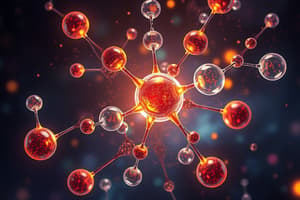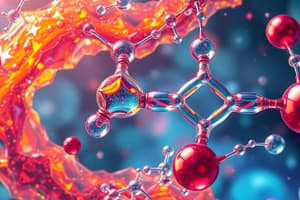Podcast
Questions and Answers
What is the purpose of ozonolysis in organic chemistry?
What is the purpose of ozonolysis in organic chemistry?
- To synthesize explosives, dyes, and pharmaceuticals
- To identify the presence of carbon-carbon double or triple bonds (correct)
- To break down a compound into smaller fragments
- To introduce specific functional groups into a molecule
What type of reaction is halogenation?
What type of reaction is halogenation?
- Substitution reaction (correct)
- Oxidation reaction
- Addition reaction
- Elimination reaction
What does nitration introduce into a compound?
What does nitration introduce into a compound?
- A hydroxyl group (-OH)
- A carboxyl group (-COOH)
- An amino group (-NH2)
- A nitro group (NO2) (correct)
Which book is recommended for further study on ozonolysis?
Which book is recommended for further study on ozonolysis?
What is the common use of nitration in chemistry?
What is the common use of nitration in chemistry?
Flashcards are hidden until you start studying
Study Notes
Ozonolysis
- Ozonolysis is a method used to cleave unsaturated bonds in organic compounds, forming aldehydes or ketones.
Halogenation
- Halogenation is a type of substitution reaction, where a halogen atom (such as chlorine or bromine) replaces a hydrogen atom in an organic compound.
Nitration
- Nitration introduces a nitro (-NO2) group into a compound, often through an electrophilic aromatic substitution reaction.
Further Study
- For further study on ozonolysis, the book "Organic Chemistry" by Jerry March is recommended.
Nitration in Chemistry
- The common use of nitration in chemistry is in the production of explosives, dyes, and pharmaceuticals.
Studying That Suits You
Use AI to generate personalized quizzes and flashcards to suit your learning preferences.




